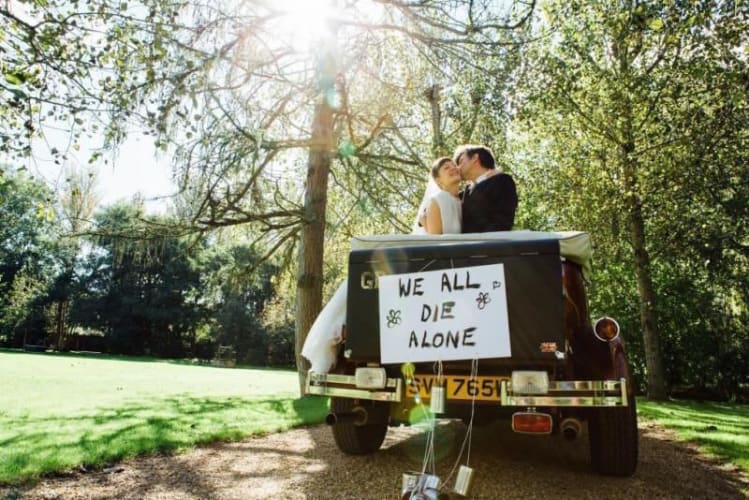What becomes of our teenage romances? Can youth’s impetuosity survive into middle age? What’s the cost to our illusions when cold reality and self-preservation creep in? Stand-up comedians have milked this bottomless pit of relational despond since time immemorial. Are women more romantic than men? Are men basically philistine?
Clichés all, ones that Ben Duke addresses with disarming charm and wry wit. Exactly and to the minute (seventy-five straight through) as he does in his one-man show Paradise Lost (Lies Unopened Beside Me) exploring man’s / God’s place in the universe.
In Juliet and Romeo: A Guide to Long Life and Happy Marriage, he has a beautiful companion, Solène Weinachter, and what an asset she is: expressive in body, face, and French-accented voice. And she can dance, which is more than one can say for Duke’s deliberate ‘dad’ dancing movement vocabulary. Wisely, he gives her the lead, whilst he snipes from the sidelines, sending up his failings.
When is the right time for the moment of truth—twenty-five years down the line? You see, Romeo and Juliet didn't die, but escaped to Paris, where life catches up with them, a miscarriage and later a child Sophie that drives sleep-deprived Juliet distracted. Romeo crawls up the wall. They don't really know each other.
Romeo has been humouring her with participation in therapeutic memory role-play, but it has become a prison for him. The once “demented cockerel” is now trying to play it with fake “deep feeling”. And it's a struggle to lift her ‘dead’ body, he’s not in great shape, he’s forty-three.
Yes, they are in therapy. This is one of their confessional therapy sessions; we are the listeners. She needs to go over and over their death scene, their passion to the death, to cope with his problems in the bedroom department and this mundane conjugal life. Their memories do not align in typical “I Remember It Well” fashion: at the party she was dressed as a chicken—no a phoenix…
He wasn't going to drink the poison in the crypt—there, he said it. He was turning the cap on not off when Juliet came round to stop him. His fingers do that almost imperceptible clockwise turn. He would like to turn the clock back and escape that fateful moment when their eyes locked at the party. She wants to remain in that glorious proof of love’s eternal passion. And so it goes.
So it goes. Here’s a handle on Duke: I read recently that he admires Kurt Vonnegut. Now I get his droll take on life. With a degree in English Literature and training in acting and dance, he has created his own hybrid stage scene to meld all three, but one senses his heart lies in the writing, very engaging in its natural cadences, rhythms and asides, his timing, hesitations and pace impressive.
Weinachter complements him: her elegance against his gawkiness, her fire against his diffidence. Their lovemaking pas de deux not quite Kenneth MacMillan—more of a wrestling match—is elemental and raw. Is Duke filtering it through a child’s eye?—there’s something of a child’s logic in his appealing for our sympathy persona. Are men children, less sophisticated than women? She likes Prokofiev; he likes New Order…
He wishes he’d not drunk too much whiskey and over-shared with that guy that Friar Lawrence sent to get their story down. What he’s written is not true, and it’s not that good, but then Romeo doesn't understand half the words. Juliet loves it, “it’s completely true, it’s in the book”. Yet when he holds his daughter for the first time, he speaks Shakespeare’s words of love with quiet feeling: “For I ne'er saw true beauty till this night”.
If we only get snippets of Shakespeare, the choice of music tells the linear story of a doomed love, doomed to endure a long marriage: from the Beatles “I Want You”, through a soupçon of Prokofiev, to Des’ree’s “Kissing You”, Simon & Garfunkel’s “Sound of Silence”, to Frank Sinatra’s “That’s Life” and Cat Power’s “Wild is the Wind” (Juliet’s lonesome torch song).
I’ve missed a few out, but you get the idea, who needs Shakespeare when there’s a treasury of song with a good beat out there for every banal occasion?
The audience love it and obviously identify with it—it’s impossible not to fall for Juliet and Romeo: A Guide to Long Life and Happy Marriage, life’s vicissitudes we’ve all been there, slung insults such as “patronising”, “out of shape”, “spoilt child”, “you’re like your mother”, “like your father”, “killed my cousin” (maybe not this one)…
After Battersea Arts, it plays at The Place from 27 February to 3 March. You do not need to know Romeo and Juliet well to get this, just its legend. Duke has done it again, riffed on a classic, I wonder which one will be next to fall under his sardonic tongue?
